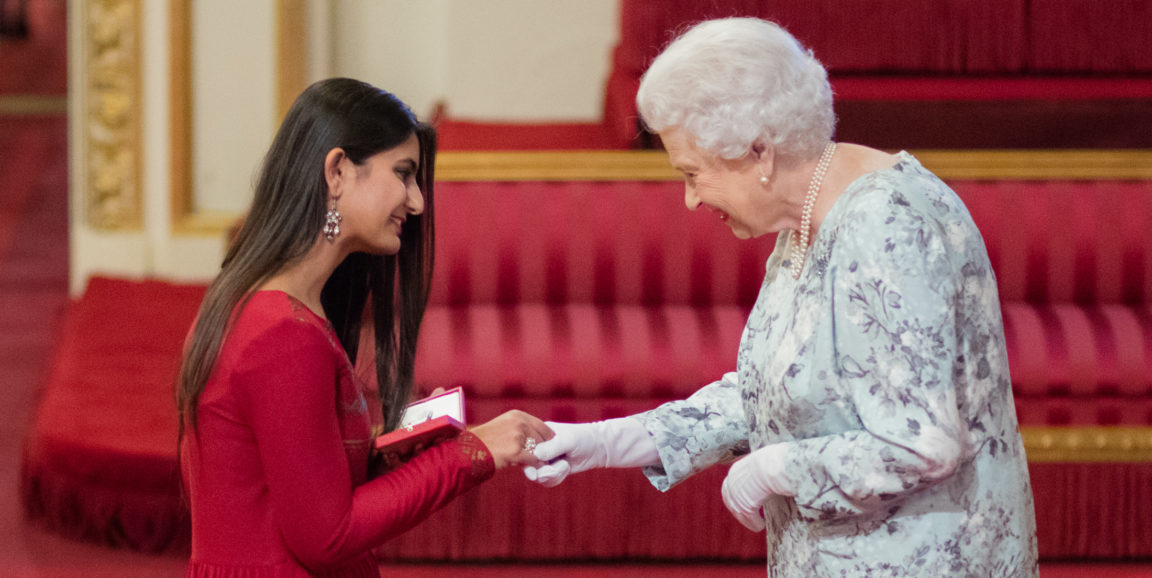Suhani Jalota was only 20 years old when she established the Myna Mahila Foundation to help impoverished women in the slums of her native city, Mumbai.
Now, at 24, she is embarking on her pursuit of a PhD in health policy on the economics track at Stanford Medicine’s Department of Health Research and Policy.
Last year, Jalota, who is also in the first cohort of Stanford's Knight-Hennessy Scholars, received a Queen’s Young Leaders award from Queen Elizabeth II, shown above, and attended the royal wedding of Prince Harry and American actress Meghan Markle, who is now Duchess of Sussex.
I caught up with Jalota recently.
Who inspired you to become a social entrepreneur at such a young age?
I come from a government family and, growing up, our conversations at home were always about the development of India and the status of women. My father has worked on water sanitation for the city; my mom works with underprivileged girl children; and my brother creates water filters. My grandparents were in the police. It’s our family calling.
As for entrepreneurship, it was Duke University, the Baldwin Scholars Program and the Melissa and Doug Entrepreneurship Fellowship that actually made me believe that all the dreams I had to change the pitiful state of things in Mumbai could actually be achievable.
Then in 2011, I met Jockin Arputham, who spent 40 years working in the slums of Mumbai as founder of Slum Dwellers International. He became my inspiration, my idol and my mentor.
What inspired you to create the Myna Mahila Foundation?
The slum community leaders and I became very chatty. That’s where the name comes from. Myna from the chatty South Asian bird and Mahila, which means women in Hindi.
You see, 320 million women in India do not have access to sanitary pads. And menstruation in India is a taboo health topic; there is stigma to shopping for sanitary pads. Most women use rags on their periods and these often become dirty, leading to urinary and vaginal infections.
When your horizon is the lining of the slum settlement, it is difficult to see another way of life. I realized the problems lay deeply entrenched in a woman’s lack of agency, or ability to make decisions. Hiding your periods, not cooking food or sleeping with the family during your periods, not going to the temple or playing sports — you believe this is the only way to live.
So we came up with a scheme to sell sanitary pads door-to-door to women who would normally not leave their homes or go to a pharmacy to buy them from male clerks. And we get to know these women; I learned that if women were confident to talk about their periods and menstrual hygiene, it could break the silence surrounding domestic violence or sanitation.
Tell us about the women who work for you and the women you serve.
We employ women from the slum communities we serve.
We currently meet about 10,000 women at their doorsteps every month across Mumbai. We’re trying to make sure that she understands that it’s a normal health cycle that should not stop her from getting her education and jobs.
What are your goals for graduate school?
To learn more research techniques to use for conducting experiments, including on women’s demand for health care, the effects of positions of power in seeking health care, and the connection between environment and health.
I will also be spending my December breaks and summers in India working at the foundation. I also hope to continue data collection for my undergraduate dissertation topic: the effect of environmental changes on health outcomes, such as child stunting levels in the slums.
I'm curious about Meghan Markle’s visit to the foundation in January 2017.
When she came to visit she told us she would support us in any way that she could. She kept her word. For us being chosen as one of seven charities for the royal wedding, I thought to myself, oh my God, she really thinks that we’re on to something that could actually change the world for many women.
I feel like I have a huge responsibility to live up to their expectations. Now we have to keep our word to them and help women meet their true potential.
A longer version of this piece appears at Stanford Health Policy.
Photo by The Queen Elizabeth Silver Jubilee Trust




